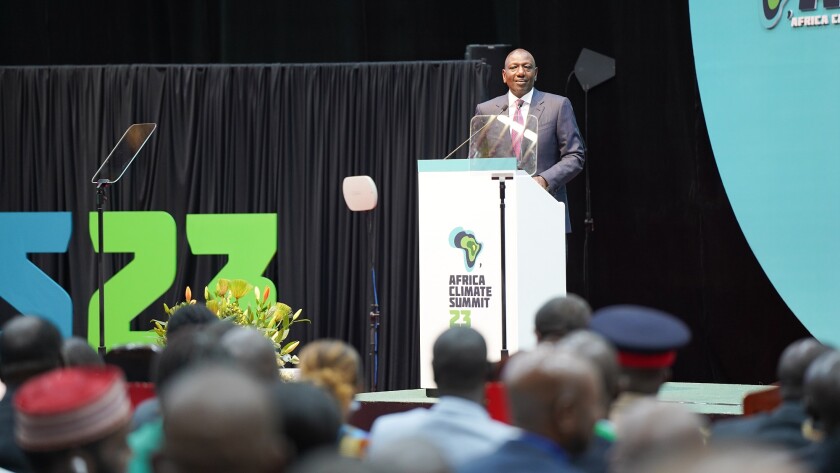African leaders called for a global carbon tax regime at the Africa Climate Summit in Nairobi on Wednesday, September 6.
The Nairobi Declaration calls for a carbon tax where major polluting countries pay more to help finance the rollout of renewable energy systems.
Kenyan President William Ruto hosted the conference from Monday, September 4, to Wednesday, September 6.
“What we are saying is that we want to pay. We do not want to say ‘let those guys pay because they are the polluters,’” Ruto told the Financial Times. “We are saying, ‘let’s all pay’, and then let’s have a mechanism where we invest these resources, where we unlock the biggest value on decarbonisation.”
However, many African governments did not take part in the three-day conference. Notable absentees include Egypt, Ethiopia, Nigeria and South Africa. These four countries are major regional economies.
Nevertheless, the Nairobi Declaration has made many headlines for its significance ahead of the UN Climate Change conference, known as COP28, due in November.
US companies brace for minimum tax impact
Businesses are bracing themselves for the impact of the US minimum tax increasing from 10.5% to 15%, according to The New York Times yesterday, September 7.
Companies including Amazon and Berkshire Hathaway could be about to face a significant increase in their effective corporate tax rates. Both corporations have historically paid less than 15% in US tax. The 15% minimum tax applies to businesses that report shareholder income of over $1 billion.
Some of these companies are now reportedly looking at how they can minimise their exposure to the tax, even looking to duck below the $1 billion threshold.
The Joe Biden administration secured the minimum rate change when it approved the Inflation Reduction Act in August 2022. This legislation increased the minimum rate included in the Tax Cuts and Jobs Act from 10.5% to 15%.
Bankruptcy petition against ex-footballer heard
A UK court has heard a bankruptcy petition that was lodged against ex-England football star John Barnes.
Barnes’s case was considered by a judge at the Insolvency and Companies Court in London on Wednesday, September 6.
The former Liverpool footballer was not present at the hearing. An official from HM Revenue and Customs (HMRC) told Judge Catherine Burton that Barnes owed the tax authority £238,000 ($297,392 ).
Barnes was represented by barrister Nathan Webb, who argued the former footballer only needed time to pay, and asked for an adjournment.
No orders were made by the judge, who said the case would be reconsidered on November 29 2023.
A previous bankruptcy petition, lodged by tax officials in June, was dismissed by another judge.
Barnes had owed at least £200,000, HMRC officials said during that past litigation. But the money had been paid, they told the judge.
India signs record number of APAs
The Central Board of Direct Taxes, India’s tax administration, signed a record 77 bilateral advance pricing agreements out of a total of 193 applications in FY 2022-23, according to its annual report published on Friday, September 1.
Most of the companies applying for such APAs in India are US businesses, while many applicants come from Japan, South Korea and the UK.
India launched the APA programme in 2012 to improve tax compliance and prevent costly transfer pricing disputes. The CBDT signs bilateral APAs with companies to approve TP arrangements for certain transactions.
Bilateral APAs can last for up to five years, but this is also the average time it takes to negotiate such an agreement in India. However, the APA programme adopted a four-year rollback policy in 2015. This allows taxpayers to retroactively apply the terms of the APA four years before it was signed.
The CBDT is still processing 309 applications and hopes to continue to reduce the time it takes to complete an agreement.
Ex-PwC partner launches own practice amid tax leaks scandal
An ex-PwC Australia tax partner has launched his own practice weeks after being named by the firm as someone who appeared in emails associated with its tax leaks scandal.
Paul McNab, who has denied any wrongdoing, was named by PwC Australia in June as one of four senior personnel who appeared in the emails before further names were revealed to a Senate inquiry.
The former PwC partner launched McNab Tax Lawyers in August, having left his role as a partner at law firm DLA Piper by mutual consent in June. He had left PwC in May 2020.
In a past statement, McNab said: “It is noteworthy that the firm has taken this action to name former partners only. I had no forewarning or opportunity to respond.
“For the record, I was not involved in any Treasury consultations regarding MAAL [the Multinational Anti-Avoidance Law] where confidential information was discussed.
“In addition, I trusted that the information shared with me as a partner of the firm would comply with any confidentiality agreements that may have been in place with Treasury.
“At all times I worked with my clients to comply with Australian law, and not avoid it.”
ITR last month reported that more than 100 PwC Australia partners had agreed to join the firm's breakaway government consultancy, Scyne Advisory.
ITR has a timeline on the PwC Australia tax leaks scandal. You can read it in full here.
Next week in ITR
ITR has the OECD’s two-pillar solution in its sights as the two-day G20 New Delhi summit opens tomorrow, September 9. G20 finance ministers will be discussing fiscal reform, and pillar one is at the top of the tax agenda.
We will be following up on the summit with in-depth analysis by Ralph Cunningham. Meanwhile, we will also be looking at the implications of the Maersk case, where the Danish Supreme Court deemed key transfers of intellectual property were controlled transactions.
Readers can expect these stories and plenty more next week. Don’t miss out on the key developments. Sign up for a free trial to ITR.












